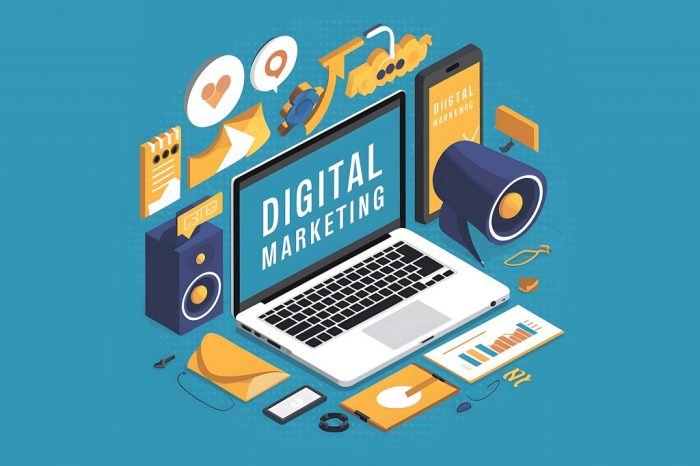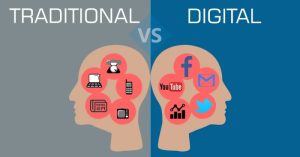
Step into the world of influencer marketing online where digital stars shine bright, captivating audiences and boosting brands to new heights. Get ready for an exciting journey filled with insights and strategies to harness the power of influencers in the digital realm.
From understanding the concept to exploring successful campaigns, this topic covers it all with a touch of interactive flair.
Influencer Marketing Online

Influencer marketing online is a strategy that involves collaborating with influential individuals on digital platforms to promote products or services. These influencers have a dedicated following that trusts their recommendations, making them valuable partners for brands looking to reach a specific target audience.
Benefits of Using Influencers for Online Marketing Campaigns
- Increased brand credibility: By partnering with influencers, brands can leverage their credibility and trust with their followers, leading to increased trust in the brand.
- Reach a targeted audience: Influencers have a specific niche or demographic that follows them, allowing brands to reach a highly targeted audience that is likely to be interested in their products or services.
- Authentic content creation: Influencers are skilled at creating authentic and engaging content that resonates with their audience, providing a more genuine way to promote a brand compared to traditional advertising.
- Boosted engagement and brand awareness: Influencers can help increase engagement levels and brand awareness through their posts, stories, and videos, leading to higher visibility for the brand.
Examples of Successful Influencer Marketing Campaigns on Digital Platforms
- Daniel Wellington: The watch brand collaborated with numerous fashion influencers on Instagram, leading to a significant increase in brand awareness and sales.
- SugarBearHair: This vitamin brand worked with influencers like the Kardashians, leading to a viral campaign that boosted sales and brand recognition.
- Glossier: The skincare and makeup brand utilized beauty influencers on YouTube and Instagram to create buzz around their products, resulting in a cult following and high sales numbers.
Marketing E-commerce
In the world of e-commerce, influencer marketing plays a crucial role in promoting businesses and driving sales. With the rise of social media platforms and the power of online influencers, e-commerce brands can reach a wider audience and establish credibility through collaborations with influencers.
Role of Influencer Marketing in E-commerce
Collaborating with influencers can help e-commerce brands increase brand awareness, reach new customers, and drive traffic to their online stores. By leveraging the influencer’s authenticity and connection with their followers, e-commerce businesses can create engaging content that resonates with their target audience.
- Choose influencers whose values align with your brand to ensure authenticity and credibility in promotions.
- Provide influencers with creative freedom to showcase your products in a way that feels natural and genuine to their audience.
- Track and analyze the performance of influencer campaigns to optimize future collaborations and maximize ROI.
Impact of Influencer Marketing vs. Traditional Marketing in E-commerce
When comparing influencer marketing to traditional marketing methods for e-commerce, influencers have a unique ability to create authentic and personalized content that resonates with consumers on a more personal level. This can lead to higher engagement, increased brand loyalty, and ultimately, more conversions for e-commerce businesses.
- Influencer marketing allows for more targeted and specific reach to niche audiences, unlike traditional marketing that may have a broader but less focused approach.
- Consumers tend to trust recommendations from influencers they follow, making influencer marketing more effective in building credibility and driving purchase decisions.
- Measurable ROI and performance tracking in influencer marketing make it easier for e-commerce brands to evaluate the success of their campaigns and make data-driven decisions for future strategies.
Advertising
In today’s digital landscape, advertising has evolved to include influencer marketing as a powerful strategy to reach target audiences in a more authentic and engaging way. Influencer marketing aligns with advertising strategies by leveraging the credibility and influence of social media personalities to promote products or services to their followers.
Types of Advertising Content
- Product Reviews: Influencers can create content such as review videos or blog posts to showcase the features and benefits of a brand’s products.
- Sponsored Posts: Brands can collaborate with influencers to create sponsored content that seamlessly integrates the product or service into the influencer’s feed or story.
- Affiliate Marketing: Influencers can earn a commission for promoting a brand’s products through unique tracking links provided by the brand.
- Giveaways and Contests: Influencers can host giveaways or contests to increase brand awareness and engagement among their followers.
Challenges and Opportunities
- Challenges: One of the main challenges of integrating influencer marketing into advertising campaigns is ensuring transparency and authenticity in sponsored content. It is important for brands to work with influencers who align with their values and target audience to maintain credibility.
- Opportunities: Influencer marketing offers the opportunity for brands to reach a highly engaged audience and generate authentic content that resonates with consumers. By partnering with the right influencers, brands can increase brand awareness, drive traffic, and boost sales.
Affiliate Marketing
Affiliate marketing is a type of performance-based marketing where influencers earn a commission for promoting products or services through unique tracking links. This can be a lucrative way for influencers to monetize their content and engage with their audience in a more direct way.
How Influencers Participate in Affiliate Marketing
- Influencers sign up for affiliate programs offered by brands or affiliate networks.
- They receive unique tracking links or promo codes to share with their audience.
- Influencers promote the products or services to their followers through various content formats such as reviews, tutorials, or recommendations.
- When their audience makes a purchase using the affiliate link or code, the influencer earns a commission.
Examples of Successful Affiliate Marketing Collaborations
- Beauty influencer promoting a skincare brand and earning a commission for every product sold through her affiliate link.
- Fitness influencer partnering with a nutrition company and receiving a commission for every subscription sign-up using her promo code.
- Travel influencer sharing a hotel booking platform and earning a percentage of the booking fees from her followers’ reservations.
Comparison with Influencer Marketing
- Affiliate marketing is more performance-based, with influencers earning a commission for actual sales or conversions, while influencer marketing focuses on brand awareness and engagement.
- Affiliate marketing allows influencers to have more control over their earnings as they directly benefit from the sales they drive, whereas influencer marketing may involve flat fees or product collaborations.
- In affiliate marketing, influencers need to disclose their affiliate relationships to comply with regulations, while influencer marketing collaborations may vary in transparency requirements.
Branding
Influencer marketing plays a crucial role in building brand awareness and shaping brand image in the online realm. By collaborating with influencers who have a loyal following, brands can reach a wider audience and establish a stronger connection with potential customers.
Contribution to Brand Awareness
Influencer marketing helps brands increase their visibility and reach on social media platforms. When influencers promote a brand’s products or services to their followers, it not only exposes the brand to a new audience but also enhances credibility through the influencer’s endorsement. This can lead to higher brand recall and recognition among consumers.
- Influencers can create engaging content that showcases a brand’s values and unique selling points, making it more memorable to the audience.
- Collaborating with influencers from different niches or industries can also help a brand expand its reach and attract diverse demographics.
- Through sponsored posts, product placements, or brand mentions, influencers can generate buzz and excitement around a brand, leading to increased brand awareness.
Role in Shaping Brand Image
Influencers act as brand ambassadors in the digital space, influencing how their followers perceive a brand. By partnering with influencers whose values align with the brand’s identity, companies can effectively shape their brand image online.
- Influencers can humanize a brand by sharing authentic and relatable content that resonates with their audience, creating a more personal connection between consumers and the brand.
- Through storytelling and creative collaborations, influencers can help highlight specific brand attributes, such as sustainability, inclusivity, or innovation, reinforcing the brand’s values and messaging.
- By leveraging influencers with a strong personal brand and online presence, brands can enhance their own reputation and credibility in the eyes of consumers.
Leveraging Influencers for Strong Brand Presence
To build a strong brand presence online, brands can implement various strategies when working with influencers.
- Identify influencers whose audience aligns with the brand’s target demographic and values to ensure authenticity and relevance in collaborations.
- Develop long-term partnerships with influencers to build a consistent brand narrative and foster loyalty among their followers.
- Encourage influencers to create diverse and engaging content that showcases different facets of the brand, helping to maintain audience interest and engagement over time.
Direct Marketing

Direct marketing is a strategy used by brands to communicate directly with targeted consumers, aiming to generate a specific response or action. Influencer marketing has emerged as a powerful tool within direct marketing, allowing brands to reach niche audiences through trusted individuals with large followings on social media platforms.
Examples of Direct Marketing Tactics
- Personalized discount codes: Influencers often share unique discount codes with their followers, incentivizing them to make a purchase and allowing brands to track the success of the campaign.
- Affiliate links: Influencers can include affiliate links in their posts, earning a commission for each sale generated through that link. This direct link between the influencer’s content and the brand’s product drives sales directly.
- Product reviews and testimonials: Influencers can provide authentic reviews and testimonials about a brand’s products, influencing their audience to make a purchase based on the influencer’s recommendation.
Effectiveness of Influencers in Driving Direct Sales
Research has shown that influencer marketing can be highly effective in driving direct sales for brands. By leveraging the trust and connection influencers have with their followers, brands can see a significant increase in conversions and sales. The direct communication and engagement that influencers provide create a sense of urgency and exclusivity, prompting followers to take immediate action.
Internet Marketing
In today’s digital age, internet marketing plays a crucial role in reaching and engaging with target audiences online. One of the key strategies within internet marketing is influencer marketing, which leverages the popularity and credibility of social media influencers to promote products or services.
Role of Influencer Marketing
Influencer marketing is a powerful tool within the broader scope of internet marketing strategies. By collaborating with influencers who have a strong following and influence over their audience, brands can tap into their loyal fan base and reach potential customers in a more authentic and engaging way. Influencers can create sponsored content that resonates with their followers, providing a seamless integration of products or services into their daily lives.
- Influencers can amplify internet marketing efforts by increasing brand visibility and awareness among their dedicated followers.
- They can help drive traffic to a brand’s website or social media channels through sponsored posts, reviews, or endorsements.
- Through influencer collaborations, brands can establish credibility and trust with consumers, leading to higher conversion rates and customer loyalty.
Impact of Influencer Collaborations
The impact of influencer collaborations on overall internet marketing ROI can be significant. By partnering with the right influencers who align with their brand values and target audience, companies can see a boost in sales, brand awareness, and customer engagement. Influencers have the ability to humanize a brand and create a personal connection with consumers, leading to a more positive perception of the products or services being promoted.
According to a study by Influencer Marketing Hub, businesses are making an average of $5.20 for every $1 spent on influencer marketing, showcasing the high return on investment that can be achieved through strategic influencer partnerships.
Mailing Lists
Building and leveraging mailing lists for email marketing is a crucial aspect of any online marketing strategy. Influencers can play a significant role in helping businesses grow and engage with their mailing list subscribers. By partnering with influencers, brands can reach a wider audience and create more personalized and engaging email campaigns.
Integrating Influencer-Generated Content
When it comes to integrating influencer-generated content into email campaigns, there are several best practices to keep in mind:
- Ensure that the influencer’s content aligns with your brand’s message and values.
- Feature the influencer’s content in a prominent way within your emails to grab the subscriber’s attention.
- Include a call-to-action that encourages subscribers to engage with the influencer’s content, such as following them on social media or visiting their website.
- Track the performance of the influencer-generated content in your email campaigns to understand its impact on engagement and conversions.
Advantages of Using Influencers for Mailing Lists
Integrating influencers into your email marketing strategy can offer several advantages, including:
- Increased reach and visibility: Influencers can help you reach a larger audience and attract new subscribers to your mailing list.
- Enhanced credibility and trust: Partnering with influencers can lend credibility to your brand and help build trust with your subscribers.
- Improved engagement: Influencer-generated content can drive higher engagement rates among your mailing list subscribers, leading to increased open and click-through rates.
- Personalized content: Influencers can create personalized and authentic content that resonates with your audience, resulting in higher conversions and customer loyalty.
Final Wrap-Up
As we conclude our exploration of influencer marketing online, remember that the key to success lies in strategic collaborations and leveraging the unique strengths of influencers. Dive into this dynamic world with confidence and watch your brand soar to new heights!
Question & Answer Hub
How can I find the right influencers for my brand?
To find the right influencers, consider your target audience, engagement rates, and authenticity of the influencer’s content.
What are some common mistakes brands make in influencer marketing?
Some common mistakes include not setting clear goals, working with influencers who don’t align with the brand, and neglecting to track ROI.
Is micro-influencer marketing more effective than working with macro-influencers?
It depends on your goals. Micro-influencers often have higher engagement rates and can be more cost-effective for niche markets.
How can I measure the success of an influencer marketing campaign?
You can measure success through metrics like engagement rates, click-through rates, conversions, and overall brand awareness impact.
What are some emerging trends in influencer marketing online?
Emerging trends include the rise of virtual influencers, increased focus on authenticity, and the use of AI for influencer selection and performance tracking.





